Objects Κέντρον Ερεύνης Ελληνικής Φιλοσοφίας
<< 10
10 >>
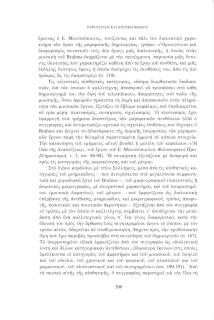
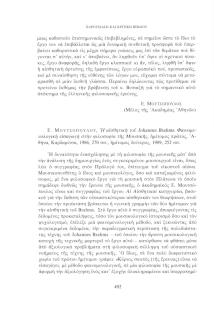
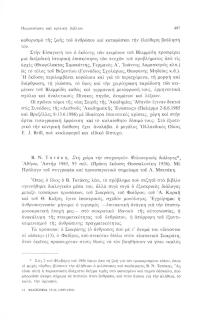
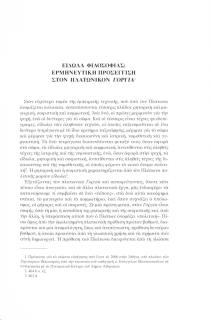
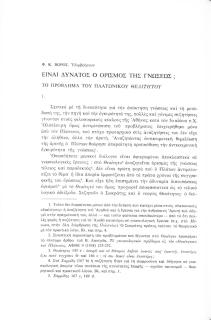
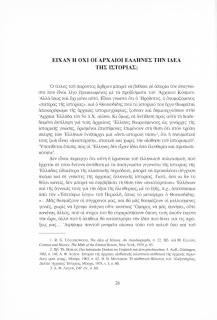
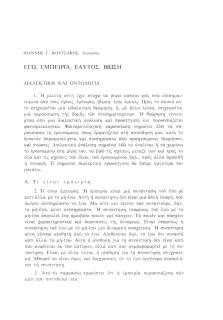
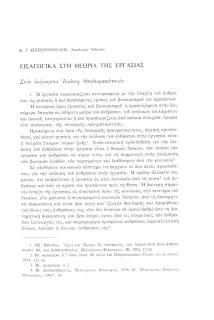
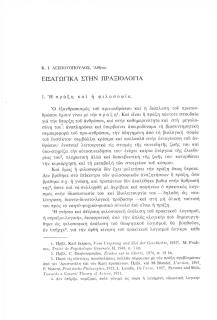
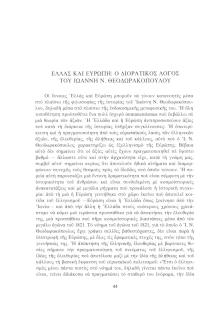
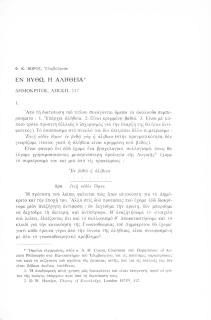
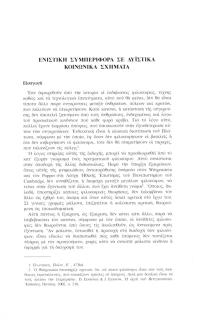 << 10
10 >>
<< 10
10 >>
Total: 4244

Ε. Μουτσόπουλου: Kairos. La mise et l' enjeu, Paris, Vrin, 1991, 325 σσ.
Ενότητα: Άρθρα του περιοδικού "Φιλοσοφία"
Δεν υπάρχει περιγραφή
Ε. Μουτσόπουλου: Η αισθητική του Johannes Brahms. Φαινομενολογική εισαγωγή στην φιλοσοφία της Μουσικής, ημίτομος πρώτος, Αθήνα, Καρδαμίτσα, 1986, 270 σσ., ημίτομος δεύτερος, 1989, 252 σσ.
Ενότητα: Άρθρα του περιοδικού "Φιλοσοφία"
Δεν υπάρχει περιγραφή
Ε.Ν. Τατάκη, Στη χώρα των στοχασμών. Φιλοσοφικός διάλογος, Αθήνα, Αστήρ 1985, 95 σελ. (Πρώτη έκδοση Θεσσαλονίκη 1936). Με πρόλογο του συγγραφέα και προεισαγωγικό σημείωμα του Λ. Μπενάκη
Ενότητα: Άρθρα του περιοδικού "Φιλοσοφία"
Δεν υπάρχει περιγραφή
Είδωλα φιλοσοφίας: ερμηνευτική προσέγγιση στον πλατωνικόν Γοργία
Ενότητα: Άρθρα του περιοδικού "Φιλοσοφία"
Δεν υπάρχει περιγραφή
Είναι δυνατός ο ορισμός της γνώσεως; Το πρόβλημα του πλατωνικού «Θεαιτήτου»
Ενότητα: Άρθρα του περιοδικού "Φιλοσοφία"
My purpose in this paper is to show that the nature of knowledge is such that it is impossible to formulate a perfect definition of it. This problem appeared in ancient times ; Plato was the first to argue that a definition of knowledge is a logical impossibility. Knowledge is true belief accompanied by an account (επιστήμη έστιν δόξα αληθής μετά λόγου) is the last formulation which Plato considered in his dialogue Theaetetus (202-210); but he refuted it arguing that it is a fallacy, whatever the meaning of the term account (λόγος) might be. He finishes the dialogue leaving the impression that another discussion might provide either a better or even a perfect definition. As far as we know no such solution can be found in any of Plato' s later dialogues ; and the dialogue Philosopher, which he seems (in Sophist) promising to write, was never written; it was not written, in my opinion, because it was not possible to be written. Later philosophers tried to solve or overcome the logical Gordian knot, but their efforts did not lead to a bette...
Είχαν ή όχι οι αρχαίοι Έλληνες την ιδέα της Ιστορίας;
Ενότητα: Άρθρα του περιοδικού "Φιλοσοφία"
A paradoxical situation has developed in studying the history of the ideas of the ancient world: contrary to the universally known fact that Herodotus and Thucydides were founders of the science of history some researchers of ancient culture are adherents of the concept that «non-historicism» is typical of ancient Greeks΄ way of thinking. The reference to Greeks rationalism and to Greek philosophers΄ search for the universal and self-identical primal element (arche) in the world, i. e., the single and invariable essence of all things, is the main argument in favour of this concept. On the basis of the comparison of Greek philosophy, especially Eleatic metaphysics (ontology), with Judaic-Christian theology, the conclusion is drawn that only single, nonrecurrent and unique events, namely, the creation of the world by God and Christ΄s appearance to the people, i. e., «God΄s humanization» and his redemptive sacrifice, can be regarded as the content of historical knowledge, as the idea of history in the true sense of the world. Some scholars al...
Εγώ, εμπειρία, εαυτός, βίωση. Διαλεκτική και οντολογία.
Ενότητα: Άρθρα του περιοδικού "Φιλοσοφία"
In this paper I discuss the structure and meaning of experience, ego and self. Searching into this structure and meaning I go back as far to the precategorial stage of experience and trace the origin of the main categories themselves in the spatiotemporal categories of «here» and «there», of «now», «before», and «after». I perceive the self as arising with temporality and being constituted as a synthesis of identity and otherness. My approach is dialectical in the sense that it is an analytic synthetic description and an «Aufhebung» in the process of which the object of study and the method change isomorphically.
Εισαγωγικά στη θεωρία της εργασίας
Ενότητα: Άρθρα του περιοδικού "Φιλοσοφία"
1. Au cours de l΄Histoire de l΄Humanité, l΄existence de l΄homme se trouve en connexion avec son travail à cause d΄une donnée quasi naturelle et grâce à une institution, ce qui comporte le conditionnement de l΄homme et de la société par le travail, jusqu΄à un certain dégré. 2. La dépendance de l΄homme, de par sa nature, par rapport à la Nature et à la société est la source et la cause de ses ((besoins», élémentaires et autres, qui pour leur satisfaction requièrent du travail. 3. Le travail apparaît comme action et comme labeur et il a ses incidences sur la réalité du monde. 4. Le travail en tant qu΄action consciente doit être conçu foncièrement du point de vue praxéologique. La structure de la praxis comprend la «délibération» et Inexécution». La «délibération» est composée de «moments» déonti- ques et de «moments» de possibles, en alternance. 5. Les distinctions entre le «travail de direction» et le «travail d΄exécution» ou le «travail intellectuel» et le «travail corporel» n΄ont qu΄une validité relative. 6. L΄inhérence, fût-elle diff...
Εισαγωγικά στην Πραξιολογία
Ενότητα: Άρθρα του περιοδικού "Φιλοσοφία"
L’analyse de la praxis par la philosophie implique l’élucidation de la différence radicale et multiple entre praxis et théorie de même que l’emploi de catégories autres que celles employées pour l’analyse de la théorie. La distinction d’origine aristotélicienne entre praxis, poiésis et théorie, valable toujours à son niveau, peut servir de base à la recherche philosophique portant sur la conscience. Au cours de cette recherche, apparaît une autre distinction, également tripartite, qui se situe au tréfonds de la conscience: élan, intuition, vision. En effet, la conscience à son état premier se constitue d’un élan de recherche, portant sur quelque chose qui est à inventer, c’est-à-dire à découvrir parmi des possibles encore inaperçus. Cet élan de recherche ne durera que jusqu’à l’obtention de son objectif par un moment d’intuition qui survient comme une inspiration de la conscience, lui relevant l’objet recherché. Cet événement révélateur, qui ainsi couronne et supprime dans la conscience l’élan de recherche comporte le dépassement de la ...
Ελλάς και Ευρώπη: Ο διορατικός λόγος του Ιωάννη Ν. Θεοδωρακόπουλου
Ενότητα: Άρθρα του περιοδικού "Φιλοσοφία"
Δεν υπάρχει περιγραφή
Εν βυθώ η αλήθεια. Δημόκριτος απόσπασμα 117
Ενότητα: Άρθρα του περιοδικού "Φιλοσοφία"
Democritus’ fr. 117 says: We know nothing in reality; for truth is in the depth. Obviously it is an enthymeme (according to later terminology) or an incomplete syllogism. Two questions arise: 1.What is the missing proposition, so that the transition from Truth is in the depth to the conclusion We know nothing in reality is justified? 2. Are the two parts of this fragment compatible? Strictly speaking they seem to be contradictory. In my article I tried to fill in the missing premiss and find a link between the two extant propositions by giving: 1. Some clarification of Democritean terminology, 2. A corresponding translation of other fragments referring to the Democritean epistemology, 3. A comparison of their meaning. Fragments related to the discussion are 6-10 and 11, 125. Between these two groups there is an apparent incompatibility ; from the former an impression of skepticism is unavoidable; in the latter a cooperation of senses and mind is discussed and a possibility (for Man) to true knowledge is seen clearly. I put forward the a...

